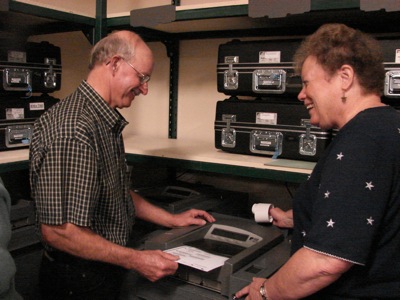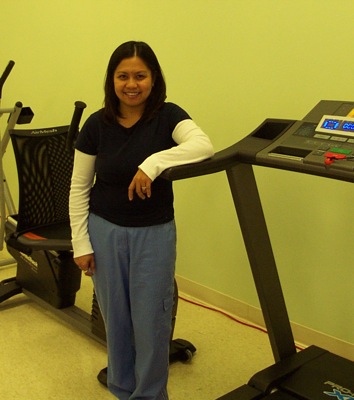Wednesday, October 24th, 2007
Local tavern operators say smoking ban is costing all
By Shelley Grieshop
Local bar owners and managers say they've lost customers, money and their tempers but aren't ready to give up the fight against the statewide smoking ban.
A group of area businessmen gathered this week to air their woes and gripes, kick around ideas and share secrets of how to avoid smoking-related citations from the health department. The group invited the newspaper to their private meeting.
The businessmen claim to be losing hundreds of dollars each week from patrons who stopped coming to their bars because they can't smoke inside. One private club manager says the weekly dollar loss has climbed into the thousands since enforcement of the workplace smoking ban began in May.
Patrick Carroll, president of the Buckeye Liquor Permit Holders Association, cheered the local owners on when he heard of their meeting to consolidate. He calls the smoking ban an "ill thought out" process that violates the very core of individual rights.
"I can't believe a judge hasn't yet ruled it unconstitutional," he told The Daily Standard.
His advice to the local proprietors was to buck the system to stay alive: "Post the signs, remove the ashtrays but let 'em keep smoking. It's a matter of business survival."
Carroll, on behalf of 325 liquor permit holders in Ohio, filed a lawsuit in December 2006 against the state board of health, challenging the law's constitutionality. The next hearing in the civil case is Dec. 20; he hopes to win the lawsuit by early next year and overturn the law passed by voters nearly a year ago.
If the suit fails, Carroll's next plan is a petition drive to revise the law to completely exempt private clubs, make smoking legal in bars with minimal food sales and exempt bowling alleys after 6 p.m. It also would create a smoking license for businesses that would pay a fee based on the maximum number of patrons allowed in each establishment.
Liquor sales in Ohio were down 7.2 percent in June, the most recent monthly statistics were available, Carroll said. The loss of local liquor sales and other bar-related business will mean less tax money coming into the state and county, the local owners pointed out.
"There'll be a trickle down affect that many people don't understand right now," said Bill Dues, owner of the St. Henry Nite Club.
The bar owners and club managers said the loss of business has caused them to cut employee hours with lay-offs likely in the future. Also, the vendors who deliver their supplies - such as liquor and food - also are reporting financial losses, the owners claimed.
All in attendance admitted they've been forced to take steps to combat their losses such as reluctantly turning away donation seekers. The nonprofit clubs such as American Legions and VFWs typically give away thousands of dollars each year to charitable organizations.
Jim Monroe, administrator at the Moose Lodge in Celina, said gross receipts from bingo events were down from $114,000 in September 2006 to $56,000 last month. A percentage of bingo proceeds are donated. He believes the smoking ban has led to fewer bingo players, which equates to a lot less money in the hands of local charities.
All but one of the businessmen in attendance Monday night admitted to allowing smoking in their establishments at all hours or at least in the evenings. If caught, the cost of a first-time violation is $100 - minimal compared with the loss of thousands of dollars in profits each week, they said.
They've discovered that many of their former customers now buy carry-out beer and go home to party instead of spending money inside the bars.
"I had an entire softball team take carry-out beer back to the diamond just so they could smoke," said Joe Puthoff, owner of the Town Tavern in Chickasaw.
Outdoor patios might have helped keep some customers this summer but winter weather will put an end to that, the group fears.
One of their biggest gripes aired was that callers can anonymously file complaints against them. If the complaints are found invalid or were lodged vengefully, they want to make sure the health department prosecutes - a stipulation of the law, they said.
Another complaint was that patrons found smoking aren't getting cited, although the establishments will get busted for the violation.
Mercer County-Celina City Health Department Environmental Director Michelle Kimmel said to date there have been no individual smokers cited in Ohio. Her reason for not doing it is the sketchy way the law is worded. She believes she'd have to actually see a smoker defy a bar owner's order to put out a cigarette, and that is unlikely.
"We're told to get in and out quickly," she said of her instructions by state officials on how to conduct the complaint-driven investigations.
Kimmel said the process leaves very little time to observe that type of scenario.
Puthoff said he should have the right to decide if his customers can or cannot smoke inside his private business.
"I don't smoke. I could have made my place nonsmoking years ago if I'd wanted to. I didn't need a law to do it for me. I can understand public places like the courthouse but this is my place. We should be able to hang a sign out front to say if we're smoking or nonsmoking. Customers can walk on by if they don't want to go in. No one's making anyone come in a bar if they don't want to."
The response:
Tension remains high between bar owners and the employee from the local health department who acts as the "smoking police" to enforce the workplace smoking ban.
Bar and club owners meeting privately this week at a local bar said they believe Michelle Kimmel, the environmental director for the Mercer County-Celina City Health Department, should look the other way and worry about more serious health matters.
Kimmel told The Daily Standard she can't ignore the law.
"If I looked the other way I wouldn't be doing my job," she said.
Kimmel admitted she voted against the smoking ban, which prohibits smoking in most public place across Ohio. Just like the opinions of the bar and club proprietors, she feels each business should be allowed to decide if their customers can smoke or not. But that's her personal opinion, not the law, which she said she must comply with. And every other Ohio citizen must, too, she said.
Kimmel said she's been threatened and intimidated by a few bar owners and managers. Although she doesn't fear for her safety, she has been legally advised to get a police escort if she returns to those businesses.
Her advice to the angry proprietors: flood their legislators with calls.
"I learned with the sewage rules, the best way to fight is to let your legislatures know how you feel," she said.
The new home septic system regulations approved last year were delayed for two years after numerous complaints were lodged by organizations and individuals around the state.
- Shelley Grieshop



